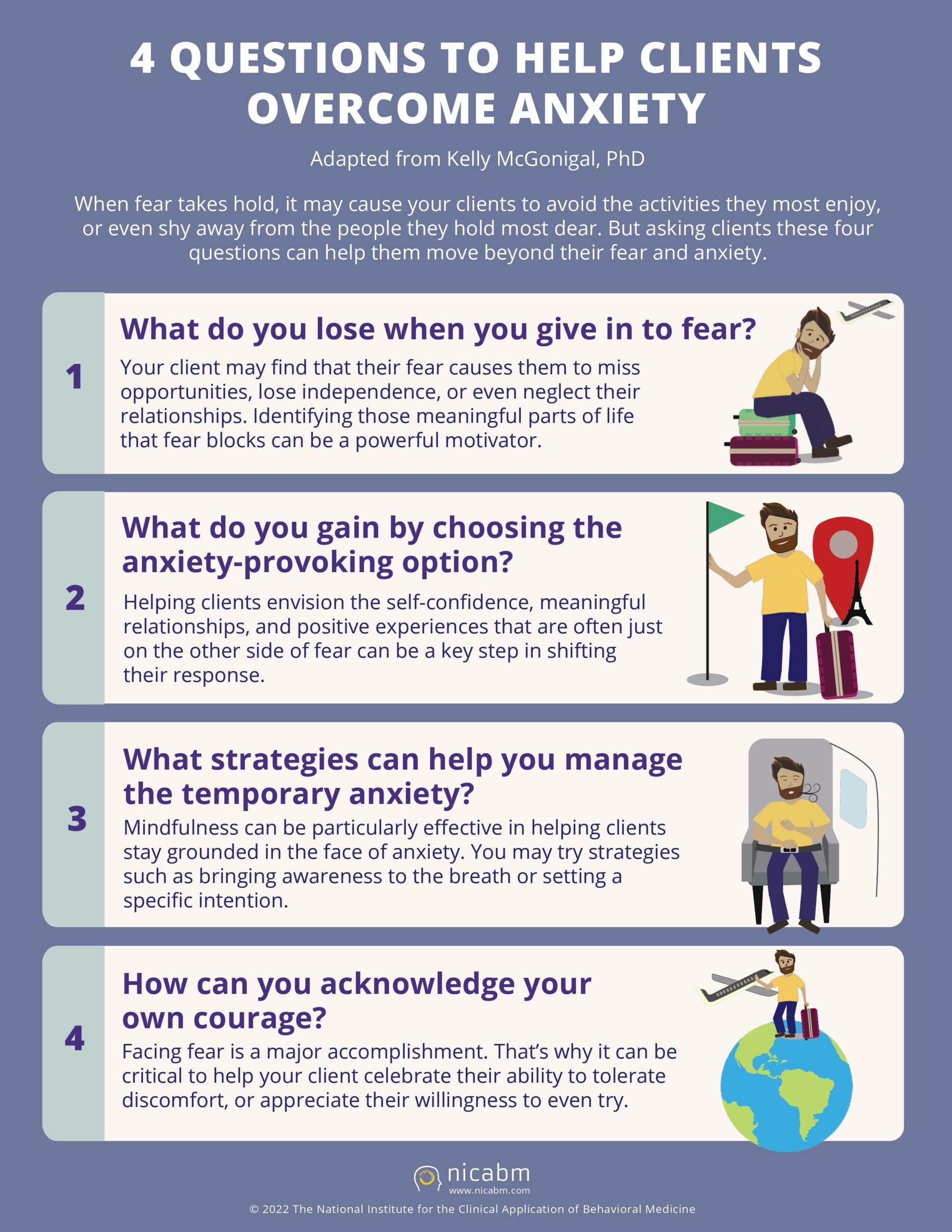Discovering Various Approaches in Counselling for Anxiety Disorder for Long Lasting Modification
When dealing with anxiousness disorders, it's important to check out a range of counseling techniques. Each approach offers unique insights and tools to assist you manage your signs and symptoms successfully. You could discover that integrating methods can generate the very best outcomes. Recognizing the subtleties of these strategies is key to promoting enduring change. What happens if the appropriate combination could release a new degree of emotional well-being for you?
Understanding Anxiety Problems: A Short Summary
Anxiety conditions, which impact countless individuals worldwide, can greatly impact day-to-day live. You could experience overwhelming feelings of concern or fret that seem uncontrollable. These sensations can result in physical signs and symptoms like an auto racing heart, sweating, or even wooziness. Typical kinds of stress and anxiety disorders consist of generalized anxiousness disorder, panic problem, and social stress and anxiety problem. Each has distinct indicators, however they all share a propensity to disrupt your regular and relationships.Understanding the source of your anxiousness is important. It could stem from genetics, mind chemistry, or life experiences. Acknowledging your triggers can assist you handle your actions better. It is very important to bear in mind that you're not the only one in this battle. Many individuals deal with similar obstacles, and looking for assistance is a solid step towards feeling better. By finding out about stress and anxiety conditions, you're currently on the course to understanding and managing your condition more properly.
Cognitive-Behavioral Treatment: Testing Negative Thought Patterns
In Cognitive-Behavioral Treatment, you'll begin by identifying the negative idea causes that contribute to your stress and anxiety. You'll function on changing them with more favorable choices as soon as you recognize these thoughts. With each other, you'll construct reliable coping approaches to help handle your anxiety in everyday situations.
Determining Adverse Idea Triggers

When you encounter moments of distress, recognizing the specific triggers behind your negative thoughts can be vital in handling stress and anxiety. Start by focusing on situations that prompt sensations of concern or concern. Is it a congested space, an approaching deadline, or a conversation with certain people? Take down these circumstances in a journal. This will certainly aid you determine patterns in your reasoning. Likewise, notice physical sensations that accompany your adverse ideas, like an auto racing heart or rigidity in your breast. By pinpointing these triggers, you obtain understanding right into what's sustaining your stress and anxiety. Comprehending these connections is the initial step in challenging those thoughts and ultimately regaining control over your psychological responses.
Replacing Thoughts With Positives
Testing negative idea patterns is an important action in transforming your frame of mind and minimizing anxiety. You may usually discover on your own trapped in cycles of self-doubt or tragic thinking. Rather than allowing these ideas dictate your feelings, method changing them with realistic alternatives or positive affirmations. When you assume, "I can not handle this," shift it to, "I can handle obstacles one action at a time." This simple change can considerably influence your emotion. Frequently recognizing and responding to these adverse ideas helps create a healthier internal dialogue. Remember, it takes time and effort, however constantly exercising this strategy can bring about long-term change, empowering you to face stress and anxiety with restored self-confidence and durability.
Structure Coping Approaches With Each Other
Replacing unfavorable ideas is just the start of managing stress and anxiety successfully. To produce enduring modification, you need to build coping strategies that encourage you. Cognitive-Behavioral Treatment (CBT) aids you determine and challenge those unhelpful idea patterns. With each other, you and your counselor can check out just how these ideas effect your feelings and behaviors.Start by developing practical strategies, like journaling or mindfulness workouts, that allow you to confront anxiousness head-on. When you face your fears progressively, you'll discover to respond differently.

Mindfulness and Acceptance-Based Approaches: Growing Present-Moment Awareness
As you browse the complexities of stress and anxiety, incorporating mindfulness and acceptance-based strategies can considerably boost your ability to grow present-moment understanding. By concentrating on the present moment, you'll discover that you can observe your thoughts and feelings without judgment (Counseling services for anxiety). This technique helps you recognize your stress and anxiety without feeling bewildered by it.Engaging in mindfulness exercises, such as deep breathing, body scans, or directed meditations, allows you to ground on your own in your present experience. Acceptance-based approaches motivate you to welcome your emotions instead of deal with against them. When you accept your sensations, they shed their power over you.Incorporating these practices into your day-to-day regimen can transform exactly how you react to anxiety. You'll establish durability and find out to browse demanding situations with higher simplicity. Eventually, growing present-moment recognition lays the structure for long-term adjustment, encouraging you to lead an extra fulfilling life
Exposure Therapy: Confronting Concerns Slowly
Direct exposure treatment aids you challenge your fears in a gradual way, making it less frustrating. You'll discover methods to encounter anxiety-provoking scenarios step by step, while also developing coping methods to handle your responses. This approach empowers you to take control and reduce anxiety in time.
Progressive Exposure Methods

When encountering anxiety, slowly facing your fears can be a powerful method to restore control. This strategy, called gradual exposure, includes slowly subjecting on your own to the situations or objects that cause your anxiousness. Beginning with much less daunting situations and slowly function your method approximately more difficult ones. For example, if you're afraid of public speaking, you might start by talking in front of a mirror, then proceed to sharing ideas with a buddy, and at some point attend to a small group. Each step helps desensitize you to the concern, building your self-confidence over time. Keep in mind, it's important to speed on your own and commemorate small success as you relocate via this process, strengthening your capability to take care of anxiety successfully.
Structure Coping Strategies
Structure reliable coping strategies is essential for handling anxiety, particularly as you challenge your anxieties gradually - Counseling services for anxiety. One effective approach is exposure treatment, where you begin by encountering your concerns in a controlled way. Begin with less frightening scenarios and slowly work your way approximately even more tough situations. This progressive exposure helps desensitize you to anxiety triggers, making them less overwhelming.Incorporate relaxation strategies, such as deep breathing or mindfulness, to calm your mind during direct exposure. Track your progression, celebrating small triumphes along the way to enhance your confidence. Bear in mind, it's alright to take your time; the objective isn't perfection yet constant enhancement. By developing these approaches, you'll encourage on your own to browse stress and anxiety and accept life more fully
Psychodynamic Therapy: Revealing Origin of Stress And Anxiety
Psychodynamic treatment checks out the subconscious mind, disclosing the root triggers of your anxiousness. By analyzing your ideas, sensations, and past experiences, this approach aids you uncover underlying conflicts and unsolved concerns that may add to your existing stress and anxiety. You'll collaborate with a specialist to examine childhood experiences, partnerships, and emotional patterns that form your actions today.As you acquire understanding into these much deeper layers of your subconscious, you'll start to identify exactly how past occasions influence your existing actions. This understanding can result in catharsis, allowing you to refine emotions you may have suppressed.Through the therapeutic relationship, you can additionally determine defense reaction that might have established over time, supplying a clearer path to change. Eventually, psychodynamic treatment outfits you with the devices to resolve your anxiousness at its core, advertising long-term transformation in your psychological wellness.
Holistic and integrative Strategies: Incorporating Methods for Greater Efficacy
Incorporating numerous healing strategies can improve your trip toward handling anxiousness much more properly. By combining aspects from cognitive-behavioral treatment, mindfulness techniques, and all natural methods, you can produce a tailored technique that addresses your special demands. You could make use of cognitive-behavioral strategies to test adverse idea patterns while including mindfulness workouts to ground on your own in the existing moment.Additionally, discovering all natural techniques such as yoga exercise or meditation can promote relaxation and reduce anxiety symptoms. This mix permits you to create website better self-awareness and resilience.Experimenting with these varied techniques can assist you find what resonates most with you. Remember, it's about finding a harmony that functions, instead than staying with a single approach. This integrative strategy not just supplies instant relief however likewise promotes long-term skills for managing anxiousness, encouraging you to recover control over your life.
The Function of Support Systems: Structure Strength Via Link
While it may seem that managing anxiousness is a singular journey, having a strong support system can play a vital role in your resilience. Bordering on your own with understanding buddies, household, or assistance groups develops a risk-free space where you can honestly share your experiences and sensations. You remind on your own that you're not alone in this struggle.These connections offer support and can supply practical coping methods that have actually worked for others when you attach with others. It's also an opportunity to gain point of view; pals can aid you see situations in different ways, decreasing sensations of isolation.Moreover, psychological support promotes a feeling of belonging, which can significantly relieve anxiety signs and symptoms. By leaning on your support system, you can construct durability and tackle obstacles more properly. Keep in mind, getting to out for help is an indication of toughness, and it can make all the difference in your journey towards handling anxiety.
Regularly Asked Inquiries
What Are the Usual Signs And Symptoms of Anxiousness Problems?
You may experience restlessness, fatigue, trouble concentrating, irritation, muscle stress, and rest disturbances. Physical signs and symptoms can include fast heart beat, sweating, and trembling. Identifying these indications early can aid you look for suitable assistance and treatment.
For How Long Does Therapy Typically Last for Stress And Anxiety Problems?
Treatment for stress and anxiety conditions typically lasts anywhere from a few weeks to several months. It truly depends on your specific needs, progression, and the techniques your specialist utilizes to help you manage your stress and anxiety efficiently.
Can Medicine Be Utilized Together With Therapy for Stress and anxiety?
Yes, medicine can certainly be utilized together with therapy for anxiety. Combining both approaches commonly boosts treatment effectiveness, assisting you manage signs and symptoms while exploring underlying concerns through therapy (Counseling services for anxiety). Constantly consult your doctor for personalized advice
Are There Self-Help Approaches for Taking Care Of Stress And Anxiety?
Yes, there are a number of self-help approaches for managing anxiousness. You can practice mindfulness, take part in routine exercise, maintain a well balanced diet regimen, develop a routine, and make use of deep breathing methods to help in reducing anxiety signs and symptoms efficiently.
How Do I Know if I Required Professional Assistance for Anxiety?

Comments on “How a licensed therapist for anxiety can help you overcome daily stress”